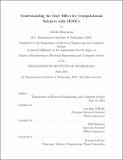Understanding the doer effect for computational subjects with MOOCs
Author(s)
Maiyuran, Jitesh (Jitesh V.)
DownloadFull printable version (3.739Mb)
Other Contributors
Massachusetts Institute of Technology. Department of Electrical Engineering and Computer Science.
Advisor
Una-May O'Reilly and Erik Hemberg.
Terms of use
Metadata
Show full item recordAbstract
In this thesis, we examined the relationship between the doer effect and learning computational subjects. Computational thinking is becoming increasingly important for students and professionals, and teaching this thought process is a relatively new practice. The doer effect is a well-studied learning phenomenon, yet its impact in computational subjects is not well-understood. Also, given that MOOCs cater to a variety of students, predicting student experience levels can benefit instructors. To address these problems, we used data from massive open online courses (MOOCs) to understand how different student activities are correlated with positive learning outcomes. We also considered the doer effect in a variety of scenarios such as prior experience, duration, and course content. Using a variety of linear models and feature engineering methods in the MOOC setting, we were able to replicate the results seen in literature and draw conclusions about the doer effect in new contexts. Because we found prior experience to correlate with student behavior, we also developed a classifier to predict student experience levels given demographic and behavioral data; our model gives strong accuracy and is robust for use in small data sets.
Description
Thesis: M. Eng., Massachusetts Institute of Technology, Department of Electrical Engineering and Computer Science, 2018. This electronic version was submitted by the student author. The certified thesis is available in the Institute Archives and Special Collections. Cataloged from student-submitted PDF version of thesis. Includes bibliographical references (pages 69-70).
Date issued
2018Department
Massachusetts Institute of Technology. Department of Electrical Engineering and Computer SciencePublisher
Massachusetts Institute of Technology
Keywords
Electrical Engineering and Computer Science.